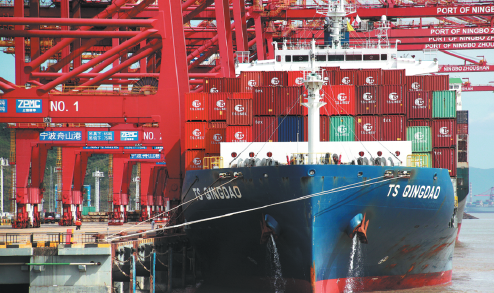Bright future ahead for bilateral businesses
Countries agree to upgrade trade agreements and expand cooperation
Business relations between China and New Zealand will be enhanced in the coming years by rising mutual investment, a complementary industrial structure and free trade deals, such as the Regional Comprehensive Economic Partnership, said government officials and business leaders.
They added that as China and New Zealand have achieved significant results in reducing trade and investment obstacles for companies in recent years, it will help guarantee supply chain operations in the Asia-Pacific region and across the world in the next phase.
During his meeting in mid-June with Deborah Geels, deputy secretary of the Americas and Asia Group of the ministry of foreign affairs and trade of New Zealand, Wang Shouwen, vice-minister of commerce and China's international trade representative, said that China will work with the Oceania country to continue to implement the protocol on upgrading the bilateral free trade agreement with high quality, and further expand trade cooperation.
Besides helping businesses to conduct mutual investment, China will explore cooperation opportunities with New Zealand in areas including new energy vehicles and infrastructure, said Wang.
He said that the Chinese government is willing to strengthen cooperation with New Zealand under the Comprehensive and Progressive Agreement for Trans-Pacific Partnership; the Digital Economy Partnership Agreement; APEC; the Regional Comprehensive Economic Partnership pact and the World Trade Organization.
Geels said that the relationship between New Zealand and China is important, and complementary economic and trade ties are a key part of bilateral relations.
New Zealand will deepen practical cooperation with China in the goods trade, trade in services, e-commerce and agriculture, while encouraging two-way investment and multilateral and regional cooperation, Geels said.
Despite a torrent of challenges such as weakening goods demand in many parts of the world and geo-economic fragmentation, China and New Zealand saw their trade value grow by 1.8 percent year-on-year to $25.15 billion in 2022, data from China's General Administration of Customs showed.
China mainly imports timber, dairy and leather products, meat, pulp and textile raw materials from New Zealand, while its exports to New Zealand are clothing, machinery, telecom equipment and parts, computers, furniture, toys and sporting goods.
The RCEP pact will benefit more New Zealand businesses in China's lucrative market in the next growth stage, said Ren Xingzhou, a research fellow and former director-general of the Institute for Market Economy of the Development Research Center of the State Council.
The RCEP came into force on Jan 1, 2022. It is a free trade agreement involving Australia, China, Japan, South Korea, New Zealand and the 10-member Association of Southeast Asian Nations. The 15 nations are home to 2.27 billion people, have a combined GDP of $26 trillion and total exports of $5.2 trillion, accounting for about 30 percent of global trade in goods.
Ren said China's economic vitality and resilience have generated growth opportunities in New Zealand and other parts of the world. Driven by policy support, domestic companies have accelerated the pace of going global to diversify market channels through outbound direct investment.
"The two countries' industrial complementarity will continue to increase their trade in both goods and services from a long-term perspective, as China, a manufacturer, needs to import many agricultural goods and commodities from New Zealand," said Zhao Ying, a researcher at the Beijing-based Institute of Industrial Economics, which is affiliated with the Chinese Academy of Social Sciences.
He said that the RCEP framework has enriched the comparative advantages of each country and made them more attractive to other member countries for trade and investment under the same conditions.
Eager to expand their market presence in China, more than 20 kiwifruit exporters have signed up for the sixth China International Import Expo, which is to be held in Shanghai from November 5 to 10, according to information released by the event's organizer in late May.
More exporters are welcome to join this year's CIIE, said Ning Feng, president of the National Exhibition and Convention Center (Shanghai), the venue for the annual expo.
Chen Zhiyang, minister-counselor of the Chinese Embassy in New Zealand, said the resilience and growth of the Chinese economy has injected confidence into the global economy and has furthered the development of China-New Zealand trade and investment cooperation.
In a recent survey released by the Auckland-headquartered New Zealand Trade and Enterprises — the country's economic development and trade promotion agency — about 64 percent of urban, middle-income earners in China recognize the top quality of New Zealand products; the highest rate among all surveyed markets.
Jane Liu, market manager for China of NZTE, predicted that more kiwifruit companies would travel to China for the CIIE this year, with the aim of building engagement with customers, channel partners and consumers.
To cut tariffs and non-tariff barriers, enhance cooperation in rule-making and boost trade in services, the two countries implemented the Upgrade Protocol of the China-New Zealand Free Trade Agreement in April 2022. It sent a clear signal that both parties are keen to enrich their business connections and support multilateralism.
Aside from assisting the goods trade, the bilateral deal has added four new chapters. They are e-commerce, competition policy, government procurement, environment and trade. These are more in line with the needs of modern economic and trade development, according to China's Ministry of Commerce.
Regarding trade in goods, the new protocol will see both countries open markets for certain wood and paper products and optimize trade practices such as rules of origin, technical barriers to trade and customs assistance.
The government branches and industry associations should better align bilateral industrial cooperation to give full play to the role of corporation mechanisms, such as the China-New Zealand Joint Trade and Economic Commission, and establish new industry cooperation mechanisms based on the needs of economic growth and cooperation, said Xu Ningning, executive president of the Beijing-based China-ASEAN Business Council.












